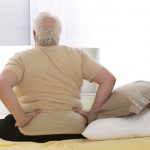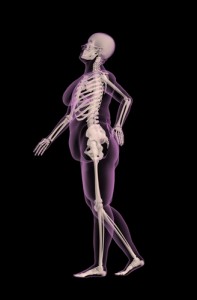 Many patients often ask, “Does being overweight affect back pain?”
Many patients often ask, “Does being overweight affect back pain?”
This a common question echoed throughout any orthopedic clinic. The truth is, yes, weight can affect your spine and cause pain. The spine is built to carry the weight of the body. The spine is very efficient at completing this function. The weight carried comes from, bone, muscle, fat, organs, etc. However, when you add extra pounds to a part of the equation, the spine must make up for it somewhere along the line. Think of a balancing scale; if you add weight to one side, it must be balanced on the other. This is why obesity puts people at very high risk for having back related problems.
Being overweight increases the load being distributed across the discs (soft cushions between vertebral bones), increases the stress across the facet joints, and can increase the stress placed across the entire spine. This can increase the rate of arthritis and degenerative disk disease. The part of the spine that is most commonly affected is the lower back known as the lumbar spine. The lumbar spine maintains a lordotic curvature. Increased stress of this curvature can cause back pain and muscle spasm. The spine is faced to carry the burden of the excess weight and structural/mechanical damage is the result.
 Obesity is a massive problem in the United States. Most people now understand that being overweight can cause heart disease, diabetes, hypertension, and certain cancers. Yet many people forget what obesity can do to the spine. In this article we have talked about this, but what can you do to combat this? Staying active, exercising, and maintaining weight has such a monumental impact on your spine but also for your overall health. In terms of the spine, exercise increases flexibility, improves poor posture, increases strength (specifically core musculature) but also pelvic and leg musculature. All of these are detrimental because they assist the back in its core function, to carry the weight of the body lightening the load on your spine.
Obesity is a massive problem in the United States. Most people now understand that being overweight can cause heart disease, diabetes, hypertension, and certain cancers. Yet many people forget what obesity can do to the spine. In this article we have talked about this, but what can you do to combat this? Staying active, exercising, and maintaining weight has such a monumental impact on your spine but also for your overall health. In terms of the spine, exercise increases flexibility, improves poor posture, increases strength (specifically core musculature) but also pelvic and leg musculature. All of these are detrimental because they assist the back in its core function, to carry the weight of the body lightening the load on your spine.
Think about your average day—I’m willing to bet you spend a large portion of it in an upright position either sitting or standing. This is accomplished by the spine. So if you are getting aches and pains, it’s time to do something proactive instead of waiting to be reactive and go to the doctor when it becomes too unbearable. We try to preach the importance of lifestyle changes at Prairie Spine & Pain Institute. It’s just one more thing that puts the patient in the driver seat. The thought process that a pill is the cure for everything is a lazy excuse and one that the general population has adapted. Obviously medications do serve their purposes, but in general many people lean on these as the only solution. Diet, exercise, activity, all plays a large role in your overall health, and specific health of your spine.
Don’t let obesity run your life. If you have more questions, come see us at Prairie Spine & Pain Institute.
About The Author: Derek N. Morrow, PA-C is a physician assistant with Prairie Spine and Pain Institute. Derek works in the clinic setting as a health care provider seeing patients. He is also utilized in the operating room as a first assist in surgery. In the clinic setting, his key function is to diagnose new patients and conduct their initial treatment. He works directly with patients to establish customized treatment programs and to monitor their progress. He also conducts history and physical evaluations for many patients. He performs many office procedures including trigger point injections, large joint injections, and bursa injections, all with the help of ultrasound guidance. He is radiologically trained, and uses his knowledge of X-ray, Ultrasound, MRI, CT, and EMG-Nerve Conduction Studies to establish a diagnosis and determine the appropriate treatment. Derek is surgically trained and plays a vital role in the procedures we perform at Prairie Spine and Pain Institute.







